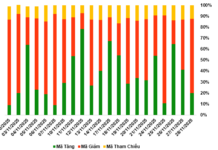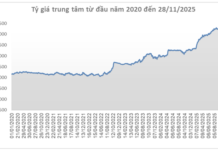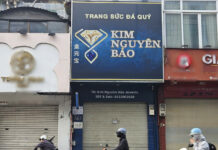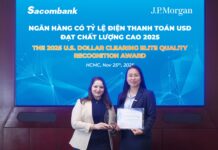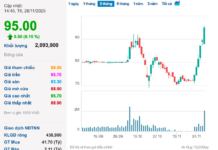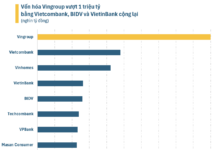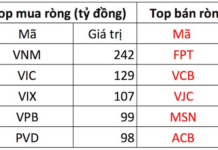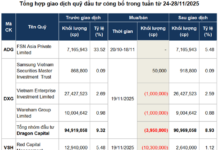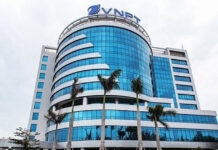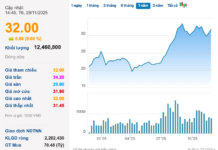On March 13, the Trade Promotion Agency (Ministry of Industry and Trade) in coordination with the People’s Government of Shandong Province (China) organized the “Vietnam-China Shandong Trade Promotion and Investment Conference”.
The event was attended by 86 companies from Shandong Province (China) and 130 Vietnamese enterprises operating in various fields including manufacturing, import-export, agriculture, food processing, logistics, construction, investment, and trade connections.
MASSIVE ECONOMIC COOPERATION POTENTIAL
Speaking at the conference, Mr. Vu Ba Phu, Director General of the Trade Promotion Agency, stated that in 2023, China had been Vietnam’s largest trading partner for over 20 consecutive years, and Vietnam had also been China’s largest trading partner in ASEAN and the 7th largest trading partner of China in 2023.
In the overall cooperation with China, the Ministry of Industry and Trade of Vietnam highly appreciated the role of Shandong Province – the leading locality in China’s economic development.
In 2023, the trade scale between Shandong and Vietnam reached 10.9 billion USD, ranking 8th among the Chinese localities that had trade relations with Vietnam and accounting for about 4.8% of Vietnam-China total trade turnover.
“With the market scale and complementary strengths of both sides, there is still a lot of potential for economic, trade, and industrial cooperation between Vietnam and Shandong. Especially in the current trend of supply chain integration in the region, the potential and demand for economic, trade, and industrial cooperation between Vietnamese localities, Vietnamese enterprises, and Shandong are still very significant,” emphasized Mr. Phu.
Shandong is a locality with a large economic scale and population (ranking 3rd in GRDP and 2nd in population in China), a market full of potential, and has excellent geographical connectivity with northern China and the world. Shandong has also seen outstanding development with key strategic orientations such as green development, strong development in the marine economy…

According to Mr. Phu, Vietnam is a gateway connecting China with ASEAN countries in both road and sea routes, with outstanding competitive advantages and meeting the conditions to become an ideal destination for foreign investors to attract new FDI sources. Vietnam is also a potential destination in the process of shifting and restructuring global supply chains and production networks.
Agreeing with this view, Mr. Tong Quan Ke, Deputy Provincial Chairman of the People’s Government of Shandong Province, stated that there is great potential and a large space for mutually beneficial cooperation between the two sides. Shandong sees trade as a new driving force. Vietnam – Shandong (China) has great complementary advantages in trade, especially e-commerce.
Mr. Vương Quần, Minister Counsellor at the Chinese Embassy in Vietnam, also stated that facing an increasingly complex external environment and many difficulties in the global economy, China-Vietnam trade and economic cooperation has shown clear resilience, with China continuing to be Vietnam’s largest trading partner and the 4th largest investor in Vietnam by 2023. Vietnam is also China’s largest trading partner in ASEAN and the 5th largest trading partner in the world.
With the effective implementation of the RCEP Agreement as well as bilateral trade agreements, the economic cooperation between the two sides will continue to improve and intensify in areas such as digital economy, green economy, supply chains, and logistics, creating new momentum for the regional and global economy.
BOTH GOVERNMENTS NEED TO SUPPORT AND CREATE A MORE FAVORABLE ENVIRONMENT
However, in order to further exploit and maximize the potential and needs of both sides, Mr. Phu respectfully suggested that the authorities of Shandong Province pay attention and create favorable conditions for Vietnamese businesses and Shandong to participate more actively in trade activities and trade promotion events organized in Vietnamese localities and Shandong Province.
Through this, expanding investment and trade in high-quality products and strengths of both sides will be facilitated, including fruits, seafood, agricultural products, processed food and beverages of Vietnam as well as machinery, electronics, chemical products of Shandong.
Supporting bilateral business cooperation in terms of investment, sharing experiences in developing agricultural processing, textile, renewable energy, electric cars, mechanical engineering, electronics, etc., which are strengths of Shandong, will help enhance Vietnam’s capacity.
At the same time, creating favorable conditions for Vietnamese enterprises to promote and build their brands in the Chinese market, especially in large distribution systems in Shandong.
For the businesses of the two countries, especially those from Shandong Province, the representative of the Ministry of Industry and Trade said that they should actively exchange and connect information about market demand and trade regulations and policies of each country through the system of Vietnamese Trade Offices/Trade Promotion Offices in Chinese localities such as Beijing, Guangzhou, Nanning, KunMING, Chongqing, Hangzhou, and soon in Haikou, Chengdu.
The businesses of the two countries also need to actively participate in international trade fairs and exhibitions organized in each country such as Vietnam Expo (April 2024), International Exhibition of International Supply Chain (June 2024), and Vietnam International Industrial Food Exhibition (Vietnam Food Expo – November 2024),… to directly connect, promote trade activities, stable, long-term and effective economic and trade cooperation.
The representative of the Ministry of Industry and Trade, Mr. Phu, pledged that the Ministry of Industry and Trade of Vietnam is ready to cooperate with the relevant authorities of China as well as Shandong Province to effectively bridge the two business communities in implementing cooperative activities in the future.
“We commit to always share, accompany, and create all favorable conditions as prescribed by Vietnamese law and international practices to help Chinese businesses invest and do business effectively and sustainably in the Vietnamese market because your success is also our success,” affirmed Mr. Phu.
Mr. Tong Quan Ke also suggested that both sides need to make good use of the opportunities provided by the RCEP, promote mutual trade promotion visits, enhance e-commerce cross-border trade, and expand cooperation in agriculture, energy, digital economy, textile, electronics, electromechanical, etc. “Shandong is ready to further expand the investment cooperation space with Vietnamese enterprises,” emphasized Mr. Ke.





